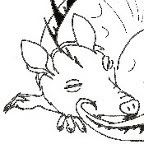 The French Lieutenant's Woman
The French Lieutenant's Womanby John Fowles
I've never read anything by Fowles. I have to admit until I saw this book on a friend's page at goodreads, I'm not even sure that I'd heard of it. But I picked it up and read it.
It is unusual: a book set in the Victorian era, but written in our time; a book that proposes to be about that time, and yet is more about our own than anything: it is about religion (or more accurately, agnosticism), madness, evolution, society, self, and sex. (A great deal about sex.) Part historical commentary, a great deal of well-written narrative, and some surprising abandonment on the part of the author of the "suspension of disbelief" (he abandons the traditional narrative voice in several places to tell the reader what he thinks as an author of writing, of the story itself, of what is about to happen to the characters. He even writes himself into the story in two places). Um—it's about a lot of stuff, but mainly a fellow named Charles Smithson. And I really ought to read it again before I attempt any real analysis of it—after all, quite a bit of it, especially the intellectual bits and theories in it went quite over my head (for example, there is a quote from Marx on the first page, as a kind of prelude to what is to follow:
Every emancipation is a restoration of the human world and of human relationships to man himself.I've turned it over and over in my head, and I still can't decide what I think it means, and what it means in relationship to the book, and as I read it again now, almost all meaning seems to fly away from it, and I am left with nothing but some strange-sounding syllables with no meaning attached. Perfect word disassociation).
The only thing that I can really think about this first reading of this incredible book is what I learned about the anima and animus in college*, and how Charles' infatuation with the namesake of the novel, Sarah Woodruff, or the "French Lieutenant's Woman" is actually a story about Charles (or possibly the narrator) falling for his anima, his true inner self embodied in a woman. By the time I was finished with the story, I was pretty well convinced that Sarah wasn't an actual woman at all, but Charles' (or the author's) anima: how he wanted, above all, to break free of the constraints of society, to be honest, to be true to himself, just as she was, regardless of the consequences.
I have to sit back, though, and wonder if the author thinks the same, or if he really thinks of her as a real character? It must be subconscious...
Anyway, I really need to re-read this one again and see what I can get from it the next time through.
*I am not about to go into all that I learned about the anima and animus and what really is going on when we fall in love—not here. But I find the theory that Jung suggests about the anima to coincide with my own views about romantic love—that when we fall in love with a person without really knowing them at all, it is really in response to love for self and seeing ourselves reflected in them; and that true love is about loving another, not being infatuated with oneself. Yeah. Not going to go into it here. But there are more things to read if you're interested in that idea, such as We: Understanding the Psychology of Romantic Love by Robert A. Johnson, or Human Intimacy by Victor Brown or what was that article on Romance Addiction? Sheesh. I've looked for it, but I can't find it or the woman who wrote it...oh well. Another post, maybe.




No comments:
Post a Comment